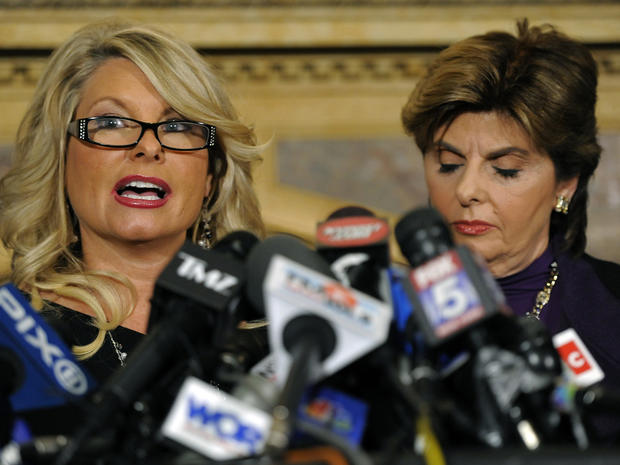Do Sharon Bialek's charges against Cain amount to sexual harassment?
A woman named Sharon Bialek today accused Republican presidential candidate Herman Cain of "sexually inappropriate" behavior in the 1990's, making her the fourth woman to do so and the first to do so publicly.
Bialek charged that in 1997, after she was let go from a part of the National Restaurant Association, she reached out to Cain (then the lobbying group's CEO) to seek help finding a new job. She alleged that while in a car, he reached under her skirt and grabbed her head, pushing it toward his crotch. When she asked what he was doing, she said he responded by asking her: "You want a job, right?"
Cain's campaign responded to the latest charges with a statement saying, "All allegations of harassment against Mr. Cain are completely false. Mr. Cain has never harassed anyone."
Bialek's attorney Gloria Allred said Bialek does not plan to file a lawsuit against Cain. Still, to clarify the legal implications surrounding Bialek's charges, Hotsheet reached out to Kathleen Peratis, a New York employment discrimination attorney and a partner at the firm Outten and Golden.
We asked Peratis if Bialek's allegations would qualify as sexual harassment charges, even though Bialek was not employed by the NRA at the time of the alleged incident.
"If he was helping to get her a job or he was using his role as a former employer to advance her ability to get a job, federal anti-discrimination in employment [statutes] might well apply," Peratis responded in an email. "Sexual harassment under federal [law] has to be either severe or pervasive. A one-time event cannot be pervasive but this one might be severe if her version is correct. The standard under a state anti-discrimination law could be stricter or more lenient. The conduct also has to be 'unwelcome' to be illegal and this criterion is the one that gives the charged party the opening to blame the victim and argue that she welcomed it."
Peratis said that the encounter Bialek described "is certainly an assault under civil law and might be criminal assault, too, but as to both, any statute of limitations is probably long since expired."
Sexual harassment is common but not nearly as routine as it was 10 or 20 years ago, Peratis said.
"Anita Hill made a big difference," she said, referencing the woman who accused then-Supreme Court Justice nominee Clarence Thomas of sexual harassment in the 1990's. "When companies started facing serious liability, they got serious about instituting rules and procedures."
